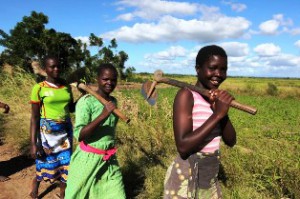Is Obama’s budget brawny or brainy?
This week, President Obama sent his budget blueprint to Congress for Fiscal Year 2012. There are two ways to measure this budget: how brawny is it, and how brainy is it?

On brawn, the budget clearly falls short. Obama proposes spending about $27 billion on development and humanitarian assistance—less than the amount Americans spent on candy in 2009. Right now, more than forty percent of the world’s population – 2.7 billion people – live in poverty, struggling to survive on less than $2 per day. That $27 billion essentially adds up to $10 for every poor person around the world; this clearly falls short of a “game-changing” investment.
But of course the question isn’t just about how much we’re spending. The most important question is about how and where we’re investing that money. And here—on the test of brains—Obama’s budget holds much more promise.
For the first time, US government decisions about how to spend anti-poverty dollars are being driven by an official Presidential Policy on Global Development —in effect, a clear strategy about how the United States intends to fight global poverty. This is important because it means we finally have a definition of what success looks like, and we can hold our aid accountable for what results it actually delivers. And that’s important because poverty is not only a moral outrage, but a clear challenge to the United States. Poverty has a corrosive effect on countries’ stability and prosperity. This, in turn, permits threats to the United States to fester. For example, if health systems in African countries can’t protect their own people’s health, it makes it easier for West Nile virus to get on a plane and infect people in the US.
In keeping with the President’s new policy, the US government is pursuing a series of reforms to the US aid system , meant to support citizens and governments around the world who are taking the lead to end poverty in their own countries. Some of these reforms actually began in under President George W. Bush. Obama has continued some of these reforms and added new ones, so that the new budget supports a number of worthy reforms:
• Investing in country-led plans for more effective and demand-driven aid. The Millennium Challenge Corporation, the Global Health Initiative, and USAID’s Feed the Future Initiative all take the priorities of citizens and their governments as their starting point.
• Focusing on the real goal: helping countries move beyond aid. The Millennium Challenge Corporation signs five-year compacts with countries that are demonstrably seeking to provide for their citizens, which allows assistance to tackle structural obstacles to development, not just piecemeal projects. USAID’s Feed the Future Initiative is shifting US assistance from stop-gap food aid to sustainable local agriculture.
• Being transparent and accountable, to US taxpayers and people in poor countries. USAID’s new evaluation policy commits to finding out what works and what doesn’t, being open about those findings, and ending things that don’t deliver results. And the new foreign assistance website shows how and where US aid dollars are spent, increasing transparency. But for these reforms to succeed, the US needs to conduct rigorous evaluations and gather the kind of detailed information that’s most useful for citizens, in the US and at the local level. These reforms can’t become a force for change without staff or funding.
• Coordinating with other donors to better meet country development needs. Through the Feed the Future Initiative, the US will keep its promises to the Global Agriculture & Food Security Program (GAFSP), a new country-driven trust fund managed by the World Bank.
• Starting with people, not bureaucracy. USAID’s Implementation and Procurement Reform commits the US to funding more local partners directly, and helps strengthen national institutions to deal with their own challenges.
As Congress considers the budget, its worth keeping an eye on these reforms. Will they stick? Or will politics overwhelm this smarter approach? Reforms that transfer information, capacity and control to recipient countries and citizens are key to making all our global poverty fighting investments most effective. The biggest question is whether this budget has enough brawn to make these brainy reforms work in practice.